
Context
Evidence reflected in the
State of Food Security and Nutrition report continues to signal a rise in world hunger. According to available data, there are nearly 60 million more undernourished people now than in 2014; between 2018 and 2019 their number increased by 10 million people.
The evidence also reveals that the world is not on track to achieve the SDG 2.1 Zero Hunger target by 2030. Combined projections show that the global number of undernourished people in 2030 would exceed 840 million.
Furthermore ...
... the
Global Report on Food Crises 2020 (GRFC) from the Food Security Information Network (FSIN) highlights that in 2019, around 135 million people in 55 countries experienced acute food insecurity. This marks the highest number in the four years since the GRFC was launched. It is crucial to act at scale across the humanitarian-development-peace nexus to build the resilience of affected and vulnerable populations.
The reasons explaining a worsening of the food security situation are intensified conflicts and greater displacement of people, more severe droughts and economic shocks in most countries. Africa remains the continent most affected by food crises, accounting for 54 percent of the global total number of people affected by acute hunger. Asia and the Middle East accounted for 32 percent of the total with an increase in the number of undernourished people.
These findings should be a wakeup call for strengthened cooperation that links together prevention, preparedness and response to address urgent humanitarian needs and root causes for food security challenges.
"To save lives, we also have to save livelihoods," said FAO Director-General José Graziano da Silva.
SDC's Approach
Sustainable agriculture ensures a healthy diet, preserves biodiversity, and is the basis for securing the human right to adequate food. With this goal in mind, Switzerland engages in international cooperation in the field of food security.
The SDC works worldwide to secure the human right to adequate food. It designs its activities with the aim of giving poorer and disadvantaged population groups, such as smallholder farmers, women and young people, equal access to education, productive resources and markets. The SDC helps them to make productive while sustainable use of natural resources and supports them in reducing and dealing with the effects of climate change, with the storage and marketing of their produce and with continuous adaptation to changing environmental conditions.
Throughout all these endeavors, the SDC persistently pays special attention to the preservation of the highly stressed biodiversity in each context and to the promotion of sustainable food systems. It also promotes needs-oriented research and advisory services. Thus, SDC encourages innovations all along the food value chain that provide consumers with a healthy and diverse diet. Thereby SDC is facilitating access to suitable foodstuffs, both in rural and in urban areas.
Key resources
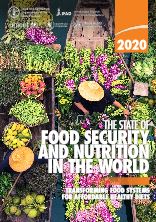 The State of Food Security and Nutrition in the World
The State of Food Security and Nutrition in the World
FAO, IFAD, UNICEF, WFP and WHO
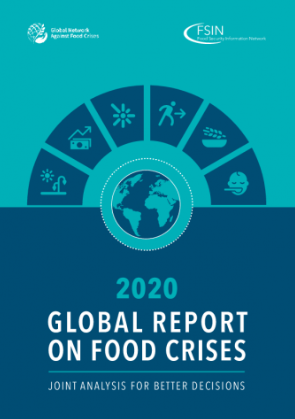 Global Report on Food Crises
Global Report on Food Crises
Food Security Information Network, 2020
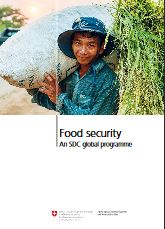 Food security - An SDC global programme
Food security - An SDC global programme
Swiss Agency for Develoment and Cooperation, 2015
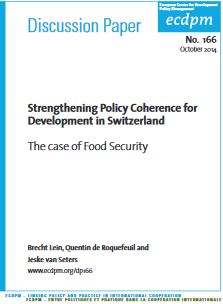 Strengthening Policy Coherence for Development in Switzerland - The case of Food Security
Strengthening Policy Coherence for Development in Switzerland - The case of Food Security
European Centre for Development Policy Management, October 2014
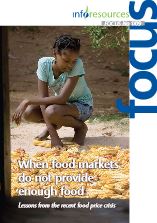 When food markets do not provide enough food: Lessons from the recent food price crises
When food markets do not provide enough food: Lessons from the recent food price crises
InfoResources Focus, 01/2009
Projects
Higher Income in the South Caucasus Thanks to Competitive Agricultural Products
(South Caucasus )The aims of the project are to strengthen smallholder farms and to provide them with access to markets, so that farmers can sell their honey, meat, cheese and wool products.
Overview of context and aim (SDC project database)
Improved Access to Markets for Fresh Fruits and Vegetable Small Scale Producers (Palestinian Authority )
With focus on private sector-led agriculture and agribusiness, this program pursues systemic change in the agriculture sector and supports business modalities that favor small scale producers in the occupied Palestinian territory.
Overview of context and aim (SDC project database)
Inclusive and sustainable local economic development (Egypt)
The overall goal of the project is to strengthen long-term resilience of communities by improving integration of rural households, farmers, small-scale businesses, youth and women into the local economic systems.
Overview of context and aim (SDC project database)
Support for cooperative management in the agricultural sector (Cuba)
The project contributes to food security in 17 municipalities by improving the management of agricultural cooperatives, strengthening tools and enhancing the capacities and conditions of cooperative members and other actors.
Overview of context and aim (SDC project database)
Improving farm productivity through dual vocational education and training (Georgia)
The project supports vocational education and training to improve productivity, farm income and the employment situation for students of agriculture.
Overview of context and aim (SDC project database)
Farmers displaced by the conflict acquire a business perspective (Sudan)The SDC supports a UN reconstruction programme in Sudan, which among other things aims to improve the economic situation of smallholder farmers.
Overview of context and aim (SDC project database)
